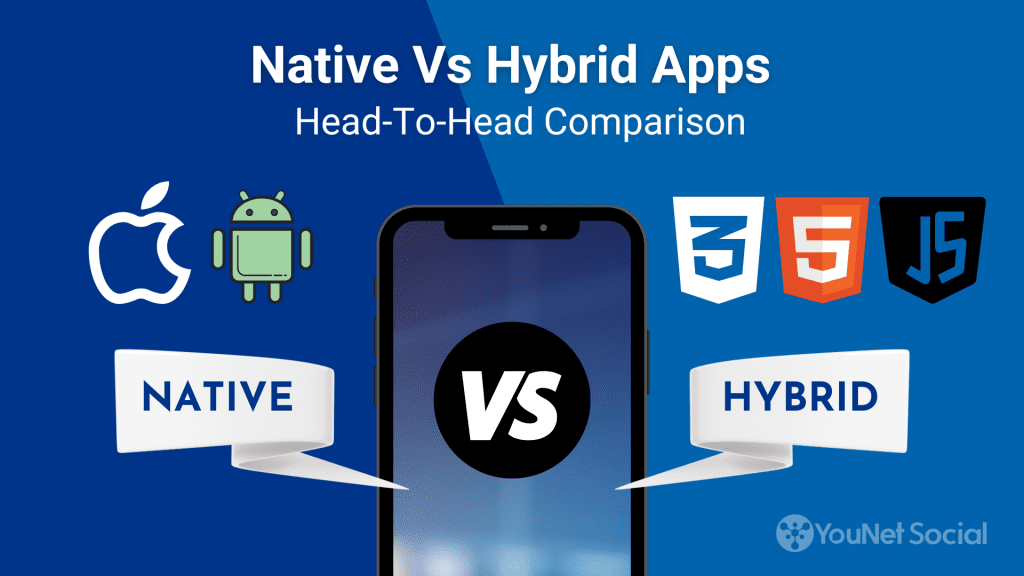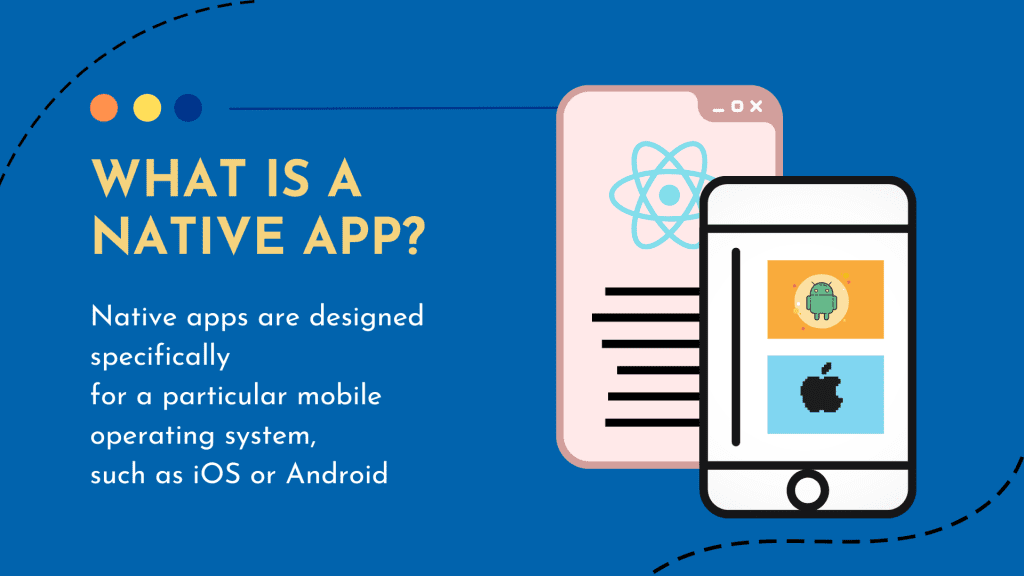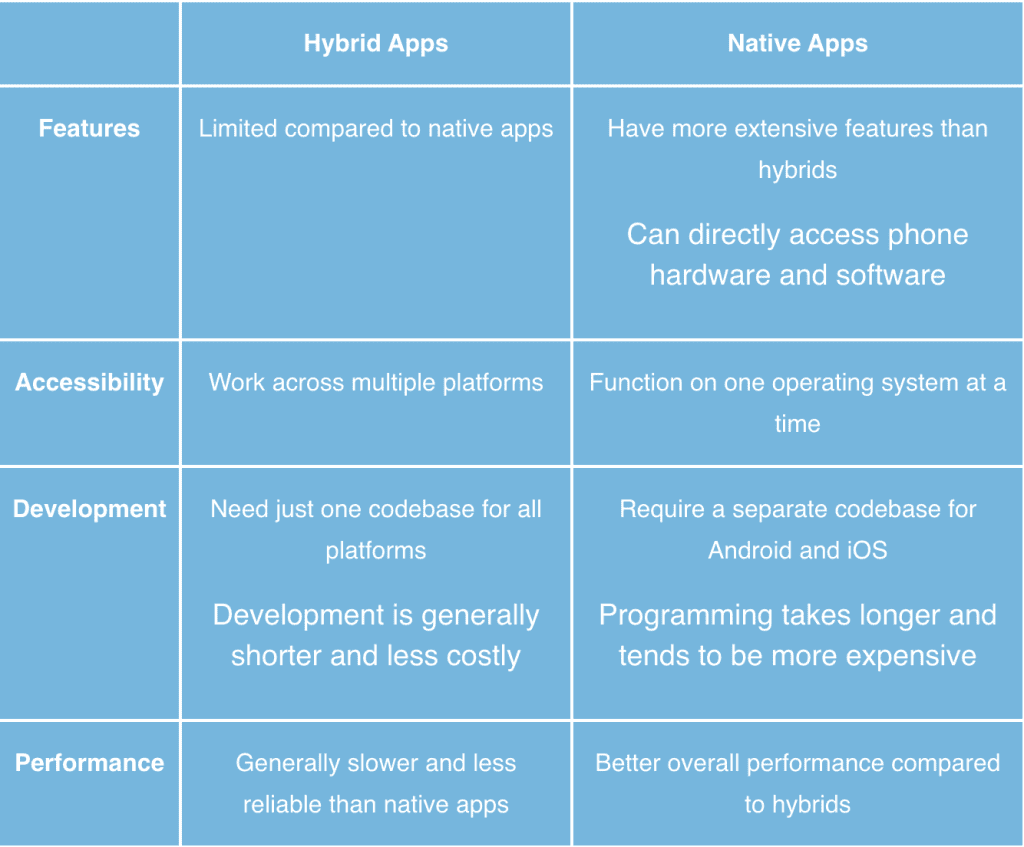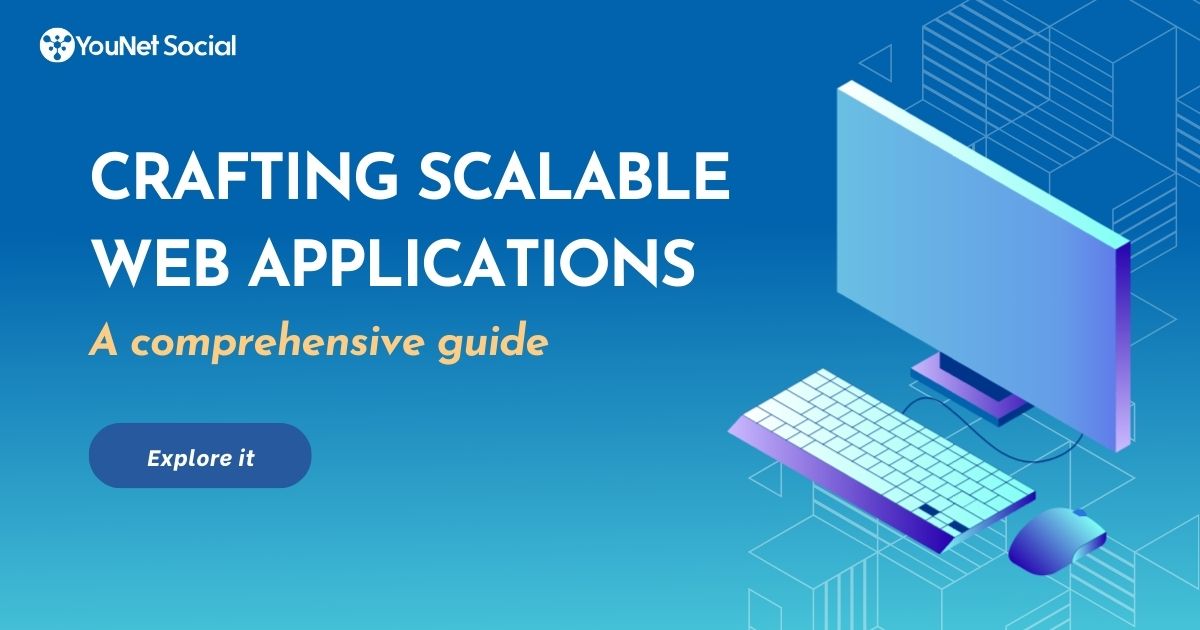

More than 90% of mobile phone users spend most of their time browsing apps and it has become so that web apps are barely used. This makes it important for businesses to make it the platform to market their brand better. In all of this, the question that comes in is how to go about this and deciding what kind of app works best for your business. With the advancements in technology, requirements can be better assessed to see whether to build native apps which are more robust or hybrid apps which take up lesser time to market.
What Is a Hybrid App?


Hybrid apps are a combination of native apps and web apps. Simply put, a web app is an app that needs a browser to function. A native app, in comparison, runs on its own after a single tap of its icon.
Hybrid apps are built using web technologies such as HTML, CSS, and JavaScript, but they are packaged into a native app shell. These shells are extra layers of code that allow hybrids to work on multiple operating systems. Although a hybrid app can run on both Android and iOS, its native shell limits its ability to fully utilize the hardware and software of the host device.
Unlike native apps, which require separate codebases for Android and iOS, hybrid apps can be developed with just one codebase. The native shell makes this possible, enabling the hybrid app to function across different platforms.
What Is a Native App?


A native app is a mobile app purposely built for a particular operating system (OS) or platform.
Two main operating systems dominate mobile devices these days: Android and iOS. A native mobile app only runs on a specific platform. For example, an iOS app can’t run on Android phones, while an Android app can’t function on an iPhone.
The nuts and bolts of a native app are programming languages that are highly compatible with the world’s biggest mobile operating systems. For example, when app developers write code for an iOS app, they use the Xcode language. Android developers, meanwhile, use Android Studio. Both X- code and Android studio work seamlessly with their respective operating systems , allowing native apps to interact directly with the device’s hardware and software.
This direct access ensures optimal performance, a key advantage of native apps over hybrid alternatives. Our skilled programmers are proficient in Android and Ios mobile development, we can guide you through leveraging native apps for your business goals. Reach out for a complimentary consultation to explore the possibilities.
Which is Best For You? Hybrid or Native App ?
To help you decide whether you need a hybrid or a native app, I’ve listed important criteria below and how each app type adds up.


Let’s delve deeper into each criterion to learn more about the key differences between hybrids and natives.
1. Features
Hybrid apps don’t have direct access to a phone’s features because of their native shell.
On the other hand, natives can directly access device features like cameras, microphones, etc. This is because the programming languages used to develop native apps are highly compatible with their host operating systems and devices.
This tight compatibility means that native apps tend to have more bells and whistles than hybrid apps.
2. Accessibility
When it comes to reaching a diverse audience, hybrid and native apps take different approaches.
Imagine you’re fishing with two types of nets: one wide and versatile, the other narrow and focused. Hybrid apps are like the wide net, able to capture users across different operating systems and platforms. In contrast, native apps are more like the narrow net, targeting users on a single platform at a time.
Hybrid apps have the advantage of being compatible with both Android and iOS operating systems, while native apps are restricted to one platform. This means a hybrid app can be accessed by users on both Google Play and the Apple App Store, catering to a larger audience. On the other hand, a native app of similar quality can only be found on one of these platforms. Unless you develop for each platform separately.
With the ability to reach users on multiple app stores, hybrids win in terms of accessibility, offering developers broader reach and greater potential for engagement.
3. Development
Developing hybrid apps is generally less complex compared to native apps.
As mentioned earlier, native apps often boast more features than hybrid ones, requiring highly skilled developers to handle the additional coding. With more features comes longer lines of code, leading to increased development costs and complexity.
Moreover, native app development requires writing code in at least two different programming languages to ensure compatibility with both Android and iOS devices. This doubles the workload for developers.
On the other hand, hybrid app developers only need to write code once to ensure compatibility across multiple platforms. This streamlines the development process, resulting in lower costs and shorter timeframes compared to native app development.
4. Performance
Comparing the performance of native and hybrid apps is like comparing fishing with a single-line rod to using a wide net. While both can catch fish, the net often wins with its larger haul.
Native apps, like the efficient fishing net, excel in performance due to their platform-specific focus and advanced development tools. They offer superior speed, stability, reliability, and user experience compared to their hybrid counterparts.
Users naturally gravitate towards apps with better performance, leading to higher user retention and engagement. This advantage is further amplified by the native app’s ability to fully leverage the hardware and software capabilities of the host device, resulting in faster loading times and fewer crashes.
Additionally, the close compatibility between native app development tools and their respective operating systems enables them to deliver higher-quality graphics, enhancing the overall user experience.
In contrast, hybrid apps, while versatile, are limited by their platform-adaptive native shells, which restrict their ability to utilize the full computing power of the host device. As a result, hybrid apps often suffer from inferior graphics, slower performance, and a higher likelihood of crashing, posing challenges for businesses reliant on app stability.
In general, the reliability and smooth performance of native apps make them more popular than hybrids. The more popular an app is, the more income it tends to generate.
The hybrid app wildcard: React Native
Many hybrid apps on the market today are developed using web technologies like HTML, JavaScript, and CSS. These technologies, which also power web apps, are partly why hybrid apps usually fall short of native apps in terms of performance.
This prompted hybrid app development experts to come up with React Native. React Natives are meant to be the happy middle ground between “pure-breed” native apps and hybrid apps. Hybrids developed using React Native tend to beat their conventional hybrid relatives in the following areas:
- Loading speed
- Reliability (less prone to freezing or crashes)
- User experience (React Native apps look and feel more like natives than hybrids)
React Natives are built using many of the components used to build native apps. Hence, the three advantages above.
Given that React Natives are almost as easy to build (and therefore as inexpensive) and versatile as hybrid apps, it may look like React Natives are the superior choice. Even big enterprises like Facebook, Instagram, and Bloomberg all build React Natives.
Hybrid or Native Apps?
It can be said that both native and hybrid mobile app development have their pros and their cons and choosing one is highly dependent on the use case and the requirements of your business. For instance, if the requirement is to pitch to investors and you need an MVP or if you require an app and don’t have much time to bring it to the market, you can opt for the hybrid approach but if you need a specialized app with various advanced features, the native approach is the way to go. Native apps also shine in scenarios where intensive hardware and multimedia performance are crucial.
End Note
At YNS, we bring your app idea to life. Our developers possess deep expertise in Android and iOS, ensuring your app meets the highest standards. We streamline the development process, reducing costs and accelerating time to market.
Whether you’re in the planning stages or ready to launch, we’re here to guide you every step of the way. Schedule a free consultation with us to explore how we can transform your app idea into a successful reality.




